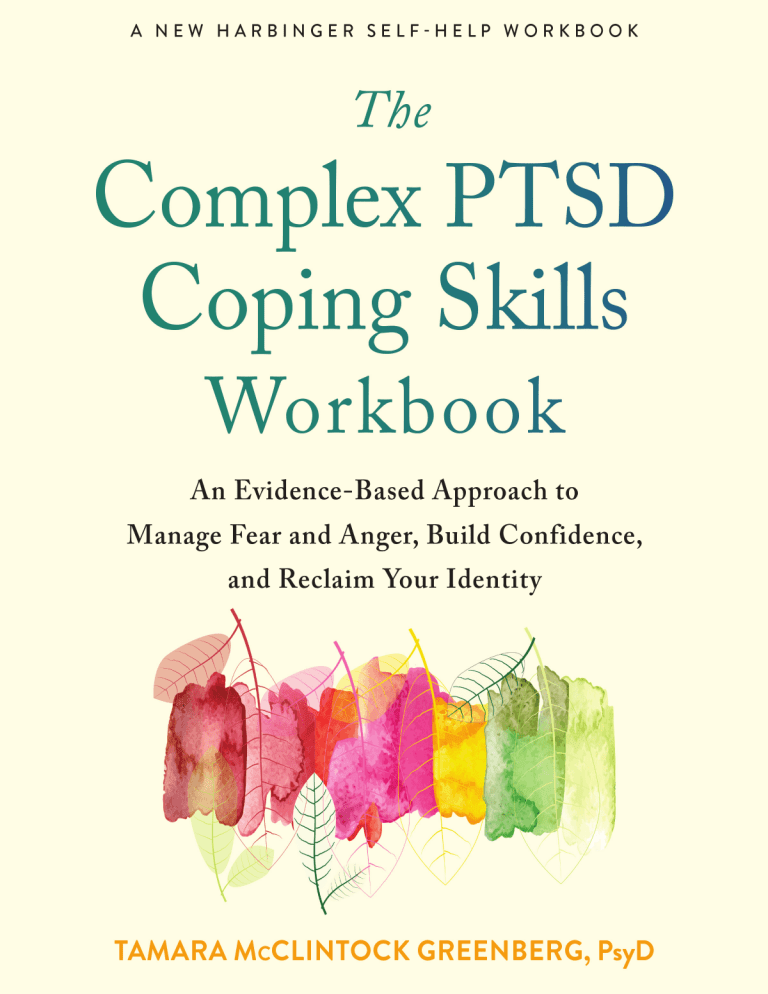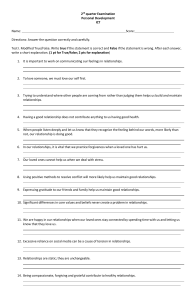
Complex PTSD Coping Skills Workbook BONUS CHAPTER © 2022 Tamara McClintock Greenberg / New Harbinger Publications. Permission is granted to the reader to reproduce this form for personal use. Complex PTSD Coping Skills Workbook When Someone You Love Has Experienced Complex Trauma When Someone You Love Has Experienced Complex Trauma Jed found the love of his life, Lisa, during their last semester of college. They met at a restaurant where they both worked, and their chemistry was practically instantaneous. Lisa was bright and hardworking. She seemed to possess a level of confidence and moxie that shocked Jed, given that the women he’d known growing up had been more timid or reserved. As they were both finishing the long road of college, both Lisa and Jed spent the first few months of their relationship practically euphoric; they both finished with good grades, Jed had already landed a great job in finance, and Lisa was headed to graduate school. The future could not seem brighter. They decided to move in together during the summer after graduation and also planned a trip to Europe before their work and school obligations began in the fall. Although moving in together is always rocky—often a true test of the strength of a relationship—Jed and Lisa’s cohabiting seemed a bit harder than most. Although Lisa was previously living in a roommate situation that she reported she did not like, she found herself extremely anxious about moving in with Jed. She could not really understand why this was the case—she loved Jed and felt this was the right thing—yet she found herself to be uncharacteristically controlling in terms of the set up in the new apartment. For example, Lisa found herself unable to make any compromises in terms of where furniture went or even where pots and pans were to reside in the kitchen. Jed did not mind that exactly, but what he found more confusing was that suddenly he and Lisa started to fight about small things. If he let a dish sit on the counter, even for a few minutes before putting it in the dishwasher, she would become enraged and accuse Jed of being a slob. Lisa was disturbed and perplexed by her own behavior. At times Jed’s very presence upset her. If he walked quietly into a room she jumped with anxiety; she did not expect him to be there. And even as her heart raced and pounded and she began sweating, she had no idea why she was so upset, so she tried to pretend that she was okay. But Lisa was not okay. Within a few months, she began drinking daily, though the couple usually just drank on weekends when they went out. At times, especially when Lisa was drinking, she would accuse Jed of being interested in other women or sometimes, of simply not caring about her. Jed was shocked, as he himself had never been happier. Their formerly mutually gratifying sex life now seemed strained. Jed felt he had limited access to Lisa; at times it seemed like she was not even there when they were intimate. Over time, Lisa gradually became more depressed and started having suicidal thoughts. Jed felt like the version of Lisa he met had vanished; he felt desperate, confused, and unsure how to help. © 2022 Tamara McClintock Greenberg / New Harbinger Publications. Permission is granted to the reader to reproduce this form for personal use. Complex PTSD Coping Skills Workbook When Someone You Love Has Experienced Complex Trauma If you recognize some aspects of Lisa in a present or past partner or a loved one, it’s possible they may have some symptoms of complex PTSD. I’ll talk in more detail below about how we think of and define complex PTSD, but if you love someone who has some or all aspects of CPTSD, you likely already know. You may be aware that your partner or loved one is suffering more than they should be. You may notice that sometimes complaints about you may not seem to be all about you, even if there are some grains of truth or validity to the gripes they have; you might sense there’s something deeper motivating what seems to be simply anger at you. More importantly, you may notice that your loved one seems distracted or even haunted sometimes, even if things seem to be going well in your relationship. Sometimes, things may seem to go to a dark place for them and you are not sure why or what set that in motion. Maybe when good things happen, they cannot be too sure if everything will really be okay, or they are not sure if they are entitled to a calm and relatively happy life. If you’re reading this chapter, you likely want to understand your partner or loved one more and want to learn how to be more supportive. Loved ones of people who have experienced complex trauma are often overlooked. This chapter is meant to serve as an introduction regarding the key issues you may face. The goal is to help you understand, but also to feel understood. It can be confusing to care about someone who is suffering from the ghosts of past trauma and I hope to help you navigate some of the disorientation you may feel. Because the understanding of complex trauma is constantly evolving, I provide some basic information on the concepts of trauma. After I describe complex trauma in more detail, I’ll describe ways that you can assess your ability to be responsive and provide emotional support, while still getting your own needs met. I chose to focus on a few of the most common issues I have heard about from loved ones over my decades of practice. Again, since this is an introduction and I’m focusing on a few key points, I’d urge you to check out the resources section of the companion text to this chapter if you’d like more information. What Is Complex Trauma? Complex post-traumatic stress disorder, or CPTSD, occurs when someone has experienced what’s known as complex trauma—trauma that’s caused not by one or two discrete traumatic events but by multiple events that have profound impacts on self-concept and ways of relating to others. CPTSD represents what is often a life filled with difficulties. As such, the symptoms of CPTSD can be more severe, long-lasting, and woven into identity, which is different than what happens with post-traumatic stress disorder (PTSD). People with CPTSD usually have experienced abuse or adverse experiences beginning in childhood. Abusive experiences include the obvious things we think of such as physical harm, sexual abuse, and emotional manipulation that involves the exploitation of power from caregivers. Other difficult or adverse experiences also include severe neglect, a parent who has been incarcerated, substance abuse in caretakers, a caretaker who was suicidal and or violence in the household while growing up. People with CPTSD also often have repeated experiences of violence, trauma or other extremely taxing events that continue into adulthood. This latter issue has been studied in a variety of ways, but the shorthand way of expressing it is to say that people who have traumatic histories may be more likely to be victimized later in life. Therefore, traditional PTSD often involves one or two discreet discrete events. Complex trauma involves the aggregate of traumatic events that have accrued over a lifetime. Complex PTSD Coping Skills Workbook When Someone You Love Has Experienced Complex Trauma Complex Trauma Impacts Identity One of the more jarring things for survivors of trauma and their loved ones is just how much complex trauma impacts identity. Trauma, especially when it is repetitive and starts in childhood, often results in a kind of identity theft. First, trauma when we are young can truncate development and limit the possibilities in becoming and realizing one’s full potential, particularly as it relates to being assertive and able to develop command and control of feelings. Also, trauma survivors often become very good at reading the needs of others. As a loved one of someone who has experienced trauma you may already know this—it’s perhaps part of what made you fall in love with them in the first place! People who have experienced trauma can be exquisitely sensitive to the needs of others, and this can be a good thing. It helps to develop relationships. However, if people with CPTSD keep their focus outside of themselves over time, they will miss out on important aspects of how they feel. I guess you could call it “people pleasing”, or in some cases simply a focus outside of their own minds, but trauma survivors often do forget to think about what is on their minds. This can be an issue in close relationships. When people develop deeper bonds, we all can get triggered about things from the past. For example, your boyfriend’s tidiness may remind you of your mom, which could be soothing or distressing depending on your relationship with your mother. Your partner’s anxiety may remind you of a parent who got anxious and then drank too much. We all get triggered in relationships, but for people with CPTSD reminders of the past are not just jarring. They can lead to overwhelming and intense feelings and behaviors that you may not understand. Let’s take a moment to consider if some behaviors in someone you love that might be confusing to you and possibly connected with CPTSD. Check off any items in the below list that apply to your loved one. Complex PTSD Coping Skills Workbook When Someone You Love Has Experienced Complex Trauma Your loved one seems to space out or disappear when difficult or highly emotional things occur. They have issues with food, either through excessively restricting calories or binging and purging. Your loved one seems to overreact and take things personally for reasons you may not understand. Your loved one can explode with anger in a way that seems out of context or not related to current circumstances. They get suicidal or harm themselves when disappointed or upset. They have nightmares and/or have trouble talking about bad dreams. You feel shut out of important aspects of their internal lives. Your loved one seems startled sometimes when you approach them. They seem to have different personas, almost like different people sometimes. They use substances excessively, especially when dealing with difficult emotional states. They blame you for things that seem unrelated to you. They get suspicious at times for reasons that seem unclear to you. They’ve implied they have a trauma history, but you really don’t know much about it. They sometimes have strong reactions to people or situations, and you are not sure what has upset them. You get mixed messages about what they prefer or what feels okay regarding physical intimacy. They seem very anxious or stirred up after having contact with family. During times when things are going well or are quiet, your loved one may suddenly become distraught. They seem numb at times and you can’t tell what they are thinking or feeling. Seemingly “random” things in the environment (like a song, a place, or odor) cause them to get upset or activated. They are unable to relax and seem to do things that keep them busy or keep them distracted. Complex PTSD Coping Skills Workbook When Someone You Love Has Experienced Complex Trauma It’s likely jarring and upsetting to think about your loved one hurting in these ways, but hopefully this list got you thinking a bit about what someone close to you might be going through and how it can impact you and your relationship. Keep in mind that this list is not exhaustive, nor is it an invitation to diagnose anyone. Rather, it’s designed to be a source of helpful information for you to consider. If you checked several of the above items, it may mean that your loved one is suffering—and you may be suffering too, as it can be hard to know how to help. Before I describe some ways that you can be supportive, let’s talk about how helpless it can feel to love someone who has undergone complex trauma, so you have ways of better understanding your own experience and that of your loved one. Feeling Helplessness in the Face of CPTSD It’s normal to feel helpless when someone you love is suffering. When your loved one has experienced trauma, it’s especially difficult because trauma and other adverse experiences are intensely personal and those who have CPTSD may not be able to articulate what their actual trauma experiences have been. One consequence of this is that it can be easy to feel left out of important aspects of their life. One woman I’ll call Keisha described the dynamic with her wife, Angie, this way: It’s like I know her and then I don’t. I mean, we love each other, and I know she’s as dedicated as I am. She tells me that I know her better than anyone and that she is more open with me than anyone else. Yet, at times, Angie seems remote, almost like in a dark place, like she’s in another world. At other times, she’s just running around and so busy; I have no access to her. I ask her what is on her mind and she either gets mad at me or just says that what she’s thinking is not that important. And she always changes the subject and asks about me. I realize now that when we met, I thought it was amazing she was so interested in me, but now I kind of wonder if she’s doing it to deflect. I feel lonely and alone with her more often than I want. Severe traumatic events are distracting. If your loved one has not dealt with some of the aftermath of their trauma, they may be unable to articulate the extent of their suffering. Either way, loved ones are often witnesses to this suffering and it can be isolating. Moreover, you may find you tend to keep an emotional record of the suffering of the person you care about (whether or not you may be aware of it). Although Keisha was busy with her own career, she found that she kept track of her wife’s moods, even developing a list of what she thought might trigger Angie. It wasn’t until we talked about her situation that Keisha even realized how much attention she paid to Angie’s distress. Most of us are wired to feel empathy, and especially when we care deeply for someone, we can feel what they feel—or even what they aren’t aware of feeling. That is, we are more likely to pick up on the suffering of others we are close to. This is hard in any case, as we must sort through a lot of difficult feelings that may not belong to us, but especially if your loved one can’t really talk about their experience, then you may feel left holding a lot of complicated and frightening emotions. As you can imagine, this can also be extremely confusing. In this landscape of whirling emotions, you can start to worry. Are you the reason they are suffering? Is it something you did? Is it something you did not do? It can be a very helpless feeling. And what is most important is that you find an avenue for empathy, while also trying to sort out boundaries. Sometimes you want to help, but it can lead to trying to help too much. Some people refer to this as a kind of codependence. The term “codependence” is complicated; as it’s used a lot in popular culture, it has now lost some of its true meaning. We’ll take some time to define it more specifically now. Ultimately, the key takeaway is that codependent-related Complex PTSD Coping Skills Workbook When Someone You Love Has Experienced Complex Trauma feelings and behaviors are often born out of both deep concern and helplessness. That said, let’s think about the idea of codependence a bit as it can apply to people in relationships with those who have CPTSD. Avoiding Codependence Below are a couple of my favorite definitions of this important idea. From Melody Beattie: A codependent person is one who has let another person’s behavior affect [them], and who is obsessed with controlling that person’s behavior. From Robert Subby: Codependence is an emotional, psychological, and behavioral condition that develops because of an individual’s prolonged exposure to, and practice of, a set of oppressive rules—rules which prevent the open expression of feeling as well as the direct discussion of personal as well as interpersonal problems. Although these definitions are different, they capture important aspects of what I am trying to convey. The idea is that although we love someone who is suffering, we need to try to keep an eye on how we manage our helpless feelings. A classic example of codependence and one that might be linked with the definition by Melanie Beattie would be something like this: Your partner drinks too much, and out of a sense of frustration and helplessness and a desire to get them to stop, you start measuring the amount of alcohol in the vodka bottle so they can see how much they are drinking. And when they complain, which is a common result of this behavior, it leads to a fight. The other person feels controlled and angry, and you likely feel more helpless and angrier yourself. The definition by Robert Subby is a bit more complicated and nuanced; I like it because it refers to all the things that go unspoken in relationships. I am extending this concept to CPTSD as survivors of trauma have so many of their own silent rules about what can and cannot be talked about. The rules can easily manifest in relationships in which loved ones can instinctively know what topics to bring up or what to avoid. Especially over the course of a long-term relationship, a culture of silence can result. Loved ones don’t want to upset survivors, but unfortunately this can lead to a kind of repetition of someone’s past in which secrets are kept and held and no one gives voice to the reality of suffering and pain. Again, my focus on the set of behaviors, thoughts and feelings that could be described as codependence are often the result of feeling helpless, which can lead to a sense of excessive responsibility and at times behaviors that can seem controlling. I realize this may be a lot to digest. If you imagine that you may have some codependent traits that might impact a relationship with someone who has experienced trauma, let’s consider some behaviors and thoughts I have noted among people who may feel overly responsible and helpless when someone they love is suffering because of trauma. Complex PTSD Coping Skills Workbook When Someone You Love Has Experienced Complex Trauma Potential Signs of Feeling Overly Responsible Aspects of codependence resulting from feeling helpless may result in you feeling more responsible than you may need to feel, and might present as these thoughts, feelings and behaviors: You find yourself more often focusing on your loved one’s emotions than your own. Your loved one remarks that you seem controlling. You find that you navigate situations to keep your loved one from getting triggered without consulting them. If your loved one is in therapy, you constantly ask what they are talking about when they are not interested in sharing. You have trouble sleeping because you are worried about your partner and if they will have bad dreams. You feel responsible every time your loved one is upset or in a bad mood. You feel like you are walking on eggshells. You try to predict your loved one’s mood and state of mind. Your worries about your loved one take away from you knowing what you feel. You minimize the impact of your own family history or adversity because of what your loved one has gone through. You apologize for things you are not sure you are sorry about. You don’t feel that you can talk about things that are on your mind or may be on your loved one’s mind. You feel responsible or overly embarrassed if the person you care about has conflicts with others where they may be at fault or have overreacted. You think about your loved one’s life more than your own. What did you find? Are there ways that you might feel overly focused on your loved ones suffering in a way that neglects your own life? Are there times when you are trying to manage your loved one’s environment in a way that might feel controlling to them? If this is the case, try not to be judgmental of yourself. But understand that you may be taking on a lot related to your loved one’s pain and it may not be helpful to you or them. Complex PTSD Coping Skills Workbook When Someone You Love Has Experienced Complex Trauma Part of caring for someone who has endured trauma is to feel and communicate your concern for them in a way that’s appropriate and healthy for both of you. If you checked a lot of the above behaviors, that may be a way to trying to communicate that you are deeply concerned, but it may also indicate that there is some confusion of boundaries and that you need space for yourself and them so you both can deal with intense emotions separately. What I’m suggesting is that while it’s not possible to care too much, it is possible to have caretaking behaviors that can be excessive and limit your loved one’s ability to deal with their own challenges. On the other the hand, they also need your support, so it’s worth spending some time thinking about the opposite end of the spectrum, when and if there are times when you have little to no compassion and are not sure what to do. When Your Patience Wears Thin Perhaps there are times—and this can be a consequence of being over involved—where you may find yourself feeling unempathic and distant. As you may imagine, this can be triggering to your loved one who may be quite sensitive to you. In my experience these extremes of being over involved and then not feeling much in the way of concern can be common. So, consider that it may be understandable if your perseverance wears thin. If your loved one gets caught up in crisis and may be anxious and depressed, it can be hard to know what to do to help. Life can be dramatic when you are with someone who has trauma. I don’t believe that all survivors necessarily seek drama, but the internal world of having dealt with traumatic events that are dramatic can lead to an external world that can be chaotic. Let’s return to Jed and hear how he expressed his helplessness and frustration about Lisa after their first 18 months together: I just don’t know what to do anymore. She’s drinking a lot, but I can handle that. What I can’t deal with is how depressed she can get. She’s been fighting with her family and then after she talks with them, she sometimes calls in sick to class the next day. She does not even get out of bed. I come home from work and she’s just lying there. I have no idea how to help her. I know she’s been through bad stuff. I’m sure I don’t even know the half of it, but sometimes, if I am being honest, I just feel like she needs to get over it. I know that’s horrible. She was in therapy, but her last therapist said she was out of her scope of practice, or something like that. I can’t do this all by myself. Maybe she’s beyond help. It’s so hard to lose patience when someone you care about is suffering, but it’s common. Again, this is when it’s important to remember the limits of your responsibility combined with the ways you can help. I remember one situation with someone who said that when his partner did not want to get out of bed, he left him alone because he thought he should not “bother him.” When I met with the couple, the man who had CPTSD and severe depression said that being left alone made him feel suicidal and scared, like his partner did not care. But the other partner did not know this—he simply thought he was being thoughtful! The takeaway: It’s important to ask what your loved one might need and not assume what they need. And when your tolerance for what is going on seems to be on a tightrope—if you’re not sure how much you can manage— you should exercise your right to give yourself some space, though in a way that does not communicate abandonment. Ultimately, the best course of action is to have an ongoing dialogue with your loved one that reflects both your wish to be supportive and that you also need to take care of yourself, so you can continue to be present and so that each of you feels known, supported, and nurtured by the other, to the best of your ability. It’s like when you’re on plane and you’re told that if there’s a need for oxygen masks, put yours on first—because you can’t help someone if you can’t help yourself first. When you take care of yourself, you put yourself in the best possible position to take care of the ones you love. Complex PTSD Coping Skills Workbook When Someone You Love Has Experienced Complex Trauma Back to Jed and Lisa: When Jed came to see me in therapy, he told me that sometimes he was not even sure if he believed Lisa about what she went through. He said this was in part because she reported different details at various times; sometimes she could not even remember what she had told him before. Jed’s frustration is understandable and common, but it’s helpful to remember that one of the key things about trauma is identity theft—the loss of a coherent sense of self that trauma can cause, especially when it’s complex in nature. Survivors of trauma often do not have a cohesive narrative of their experience. Therefore, people with CPTSD may have diverse or distinct memories depending on their state of mind. By this I mean that someone can recall something one day or even one minute and not remember it. It has to do with how difficult memories are to think about. I realize this can be confusing to you as a loved one, but it’s common if dissociation is present. Briefly speaking, dissociation has to do with ways that survivors of trauma leave stressful experiences. (It’s discussed in detail in chapter 4 of The Coping Skills Workbook for CPTSD.) We’re not exactly sure of all the reasons for this way of dealing with trauma and stress, but it may have to do with intense anxiety and how it overloads the system. People often “leave” their minds and bodies during trauma; this has neurological consequences related to how memories are formed, and so it can be tough for them to recall events. When they do, memories are often in fragments, or shards in an incomplete kaleidoscope. So, you may feel left out in understanding your loved one, in a way that is just inherent to the process of CPTSD. But they are not leaving you out intentionally; your loved one may be struggling with a deep confusion about their own history. In fact, sometimes, they are just trying to survive. Thus, you need to find a way to help both them and yourself. This task starts with finding a balance within the spectrum of feeling overly responsible, feeling utterly helpless, giving up, or succumbing to resentment. So, let’s consider some practical tips that honor the needs of both yourself and the person you care about when dealing with CPTSD. Complex PTSD Coping Skills Workbook When Someone You Love Has Experienced Complex Trauma Tips for Helping Your Loved One • Don’t take their distress personally; if they complain about you, try to listen, and consider their point of view. • Do ask if there are things you can do to help. • Don’t feel pressured to fix the situation your loved one happens to be in. • Don’t simply offer platitudes like “Everything happens for a reason” or “You’re strong because you have suffered.” These can be invalidating when someone is embroiled in a painful struggle. It’s often better to just listen and honor how your loved one feels, letting them know you see their pain and want to hear what they’re feeling and thinking. • When they seem intensely angry and fearful, try to listen without judgment. • If they need you to agree about how someone has hurt them, start first by focusing on how they feel they have suffered before offering alternative explanations for the other person’s behavior. • It’s okay to agree with feelings without validating or invalidating someone’s experience. • Provide space without a sense of abandonment—if you think your loved one may need space ask them but try to communicate that you are not leaving emotionally. • If you need space, state this clearly while not making it personally related to your loved one. • Encourage your loved one to find a formal support system such as therapy if that feels appropriate. (You can also read chapter 9 of The Coping Skills Workbook for PTSD if you’d like more information on how people with CPTSD might or might not want to engage with therapy.) • If your loved one ever experiences suicidal ideation, talk with them (at a safe moment when they are not directly in danger) about what you can do to prevent these feelings and thoughts from worsening. • If you feel they drink or use substances too much, communicate your concern, but avoid being judgmental and/or using with them if you don’t want to. • As your loved one’s distress might trigger things from your own past, try to be aware of this and consider therapy for yourself as well. • Urge them to have a wide support system; you can’t do it all. Complex PTSD Coping Skills Workbook When Someone You Love Has Experienced Complex Trauma Conclusion Loving someone who has survived complex trauma can be challenging. It can be hard to feel helpless and unsure of how to help alleviate their suffering. For people who have experienced trauma, their journey to healing is intensely personal, but they also need a wide support system and community of people who care. For loved ones, it’s about finding balance between remembering what a soothing presence you can provide, while avoiding the trappings of over responsibility, as this can result in more feelings of helplessness. Finally, since you may have been drawn to someone with a trauma history, this can mean you are a sensitive and caring soul. It can also mean you may have your own ghosts from the past—for instance, experiences of caretaking for others growing up that predispose you to want to take on that responsibility in adult relationships, in ways that may not always be healthy for either of you— and if this is the case, remember that your own mental health needs are just as important as the person you care about. References Beattie, M. (1986). Codependent no more: How to stop controlling others and start caring for yourself. Center City, MN: Hazelden. Beckes, L., Coan, J. A., & Hasselmo, K. (2013). Familiarity promotes the blurring of self and other in the neural representation of threat. Social Cognitive and Affective Neuroscience, 8(6), 670–677. https://doi.org/10.1093/scan/ nss046. Matsakis, A. T. (2013). Loving Someone with PTSD. Oakland, CA: New Harbinger Publications. Wegscheider-Cruse, S., U.S. Journal of Drug and Alcohol Dependence, Inc., & Health Communications, Inc. (1984). Co-dependency, an emerging issue: A book of readings reprinted from FOCUS and FAMILY and chemical dependency. Pompano Beach, Fla: Health Communications, Inc.





